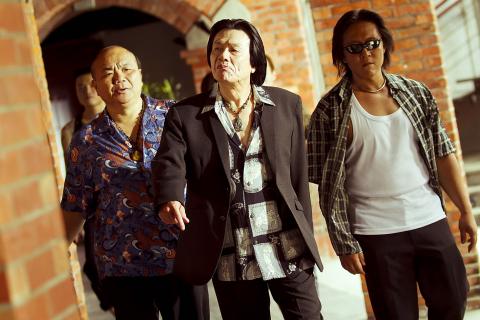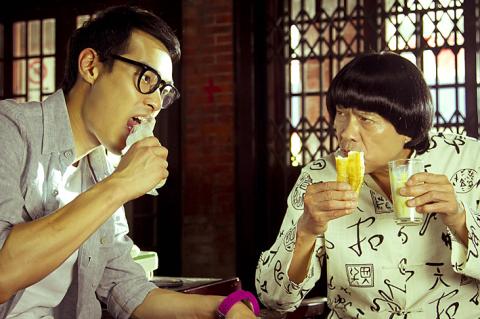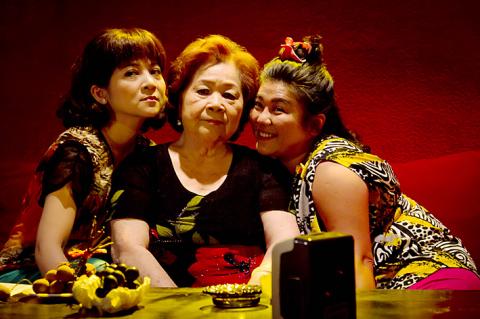A debut feature by Chiu Li-kwan, a big shot in the entertainment business whose career spans nearly 30 years, David Loman brings back bawdy humor and grassroots comedy that have subsided after the heyday of stand-up comedian Chu Ko Liang (豬哥亮), who rose to superstardom and became a household name in the 1980s. Tailor-made for the now 66-year-old Liang, the movie is a well-executed work of entertainment highlighting off-color humor without compromising a solid story line.
Liang plays David Loman, a simple country bumpkin who accidentally becomes a big boss in the criminal underworld. A decade passes, and life seems to go on as usual — drinking tea, solving everyday problems for locals and receiving “protection fees” — until one day a deity tells David through a medium that he needs to find a double to avoid a catastrophe. Panicky, the boss seeks help from Old Ho, a fortune teller also played by Liang, who agrees to pass as David for a few days, but is assassinated when attending a gathering with fellow gangsters.
The mastermind behind the killing is Pinch Junior, played by funnyman Kang Kang (康康), the son of the late Boss Pinch, who passed his authority on to David 10 years previously.

Photo courtesy of Polyface Entertainment Media Group
Blaming David for his father’s death, Xiao Ho (Tony Yang, 楊祐寧) soon reconciles with the boss who vows to avenge Ho’s murder. They become apprentices to Silly Pork, played by veteran actor Chen Po-cheng (陳博正), a kung-fu warrior who used to be a bodyguard for former president Lee Teng-hui (李登輝), and quickly masters the one-finger, martial-arts technique.
It doesn’t take long before David’s estranged daughter Jin (Amber Kuo, 郭采潔) finds out the truth and joins the team. Fighting bad guys at night, the three masked fighters win popularity among locals, and in the process, David is also able to make up for lost time and rebuild the father-daughter relationship with Jin.
The day of reckoning arrives when Pinch Junior holds a public memorial ceremony for his late father and declares his legitimacy as the rightful big boss.

Photo courtesy of Polyface Entertainment Media Group
Wearing a floral print shirt and wooden clogs, Liang thrives in the title role as a good-natured, foul-mouthed old man constantly hurling quips and risque jokes that often involve a fixation with the male and female sex organs. The film’s boisterous and boorish humor relies heavily on cleverly written wordplay in Mandarin, English and Hoklo (commonly known as Taiwanese). A good example can be found in the title of the movie, which is a phonetic translation of “underworld boss” in Hoklo.
While Liang’s untamed humor recalls the pre-feminist era, director Chiu updates her comedy with contemporary elements such as the syndicate using Facebook to boost its popularity. More interestingly, the conventions of kung-fu and superhero movies are borrowed to create a comic, satirical effect. The elegant moves of wing chun (詠春) are replaced by the one-finger technique which can be easily mastered by banging one’s finger with a hammer. And the much revered deity Guan Gong (關公) becomes an inspiration to the trio of homegrown superheroes and heroine. To director Chiu’s credit, no comic segment ever spins out of control or is disconnected from the rest of the movie, showing an all-too-rare ability to weave seemingly peripheral humor into a sensible whole.
Meanwhile, romance kindles between Kuo and Yang, who make a lovable on-screen couple, though the toothsome Yang looks nothing like a zhainan (宅男) — the Taiwanese equivalent of the Japanese otaku, or nerd — even wearing a pair of black-rimmed glasses. The movie is also delightfully supported by a string of cameos by actors and entertainers including actress Su Chu (素珠), Jeff Huang (黃立成), Ma Nien-hsien (馬念先) and Yin Wei-min (應蔚民), better known as Clipper Xiao Ying (夾子小應).

Photo courtesy of Polyface Entertainment Media Group
Fast-paced and packed with bawdy humor, David Loman should do well at the box office over the Lunar New Year, which sees several Taiwanese movies hitting the big screen to entertain the holiday crowds.

Photo courtesy of Polyface Entertainment Media Group

Photo courtesy of Polyface Entertainment Media Group

JUNE 30 to JULY 6 After being routed by the Japanese in the bloody battle of Baguashan (八卦山), Hsu Hsiang (徐驤) and a handful of surviving Hakka fighters sped toward Tainan. There, he would meet with Liu Yung-fu (劉永福), leader of the Black Flag Army who had assumed control of the resisting Republic of Formosa after its president and vice-president fled to China. Hsu, who had been fighting non-stop for over two months from Taoyuan to Changhua, was reportedly injured and exhausted. As the story goes, Liu advised that Hsu take shelter in China to recover and regroup, but Hsu steadfastly

Taiwan’s politics is mystifying to many foreign observers. Gosh, that is strange, considering just how logical and straightforward it all is. Let us take a step back and review. Thanks to the Chinese Nationalist Party (KMT) and the Taiwan People’s Party (TPP), starting this year people will once again have Christmas Day off work. In 2002, the Scrooges in the Democratic Progressive Party (DPP) said “bah, humbug” to that. The holiday is not actually Christmas, but rather Constitution Day, celebrating the enactment of the Constitution of the Republic of China (ROC) on December 25, 1947. The DPP and the then pan-blue dominated legislature

If you’ve lately been feeling that the “Jurassic Park” franchise has jumped an even more ancient creature — the shark — hold off any thoughts of extinction. Judging from the latest entry, there’s still life in this old dino series. Jurassic World Rebirth captures the awe and majesty of the overgrown lizards that’s been lacking for so many of the movies, which became just an endless cat-and-mouse in the dark between scared humans against T-Rexes or raptors. Jurassic World Rebirth lets in the daylight. Credit goes to screenwriter David Koepp, who penned the original Jurassic Park, and director Gareth Edwards, who knows

Focus Taiwan reported last week that government figures showed unemployment in Taiwan is at historic lows: “The local unemployment rate fell 0.02 percentage points from a month earlier to 3.30 percent in May, the lowest level for the month in 25 years.” Historical lows in joblessness occurred earlier this year as well. The context? Labor shortages. The National Development Council (NDC) expects that Taiwan will be short 400,000 workers by 2030, now just five years away. The depth of the labor crisis is masked by the hundreds of thousands of migrant workers which the economy absolutely depends on, and the